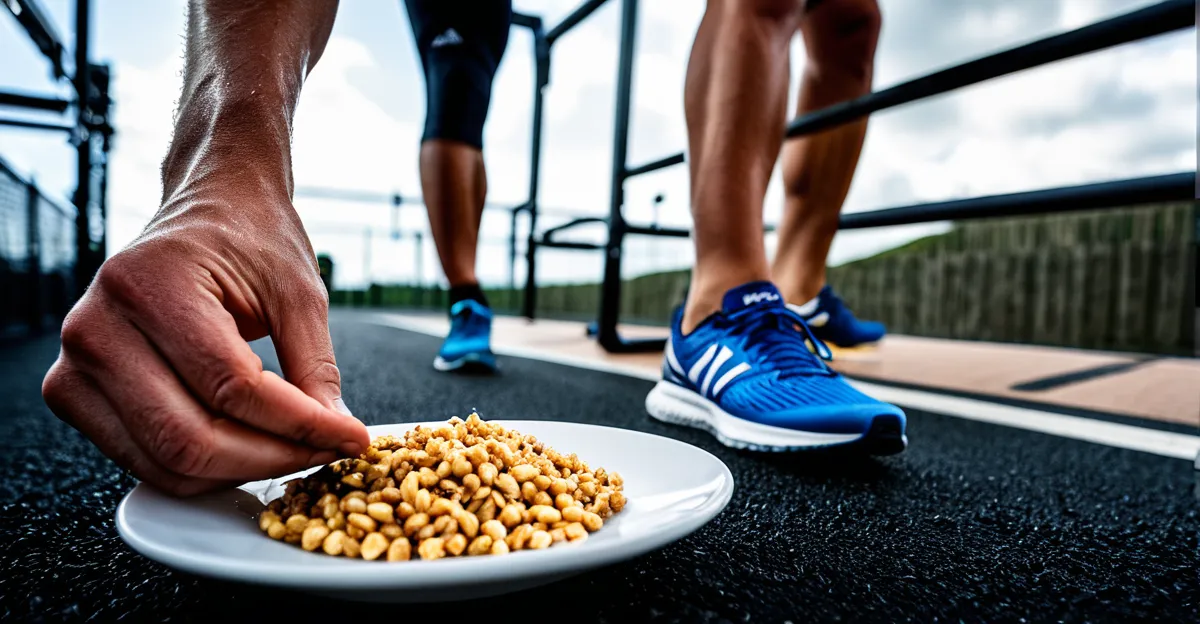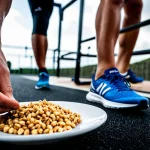The Critical Influence of Nutrition on Athletic Performance in the UK
Nutrition plays a fundamental role in shaping the growth, recovery, and overall performance of UK athletes. Scientific studies consistently demonstrate that tailored nutrition strategies contribute significantly to enhanced endurance, strength, and skill execution. For example, adequate intake of nutrients supports muscle repair and energy replenishment, directly impacting outcomes in competitive sports.
UK athletes face unique challenges, including variable weather conditions that can affect hydration needs and the availability of certain fresh foods. Additionally, balancing intense training schedules with optimal nutrition can be demanding due to lifestyle constraints or limited access to specialized sports nutrition services in some regions. These factors underline the importance of evidence-based nutrition tailored specifically to the UK sporting context.
Also to read : How Do UK Athletes Prepare for Major Competitions?
Sports science evidence reinforces the link between nutrition and athletic success in the UK. Comprehensive research highlights how macronutrient balance and micronutrient adequacy influence performance markers such as reaction time, stamina, and recovery speed. This body of knowledge empowers athletes and support teams to develop nutrition plans that maximize potential and reduce injury risks.
In summary, nutrition and athletic performance in the UK are deeply intertwined. Recognizing the scientific findings and addressing local challenges ensures UK athletes can achieve and sustain peak performance through informed dietary choices.
Additional reading : How Does Fan Engagement Impact the Success of UK Sports Teams?
Macronutrient Needs and Balance for UK Athletes
Understanding the precise macronutrient requirements is essential for optimizing an athlete diet UK. Carbohydrates serve as the primary fuel source during high-intensity and prolonged exercise, with recommendations typically ranging from 5 to 7 grams per kilogram of body weight daily for moderate training, increasing to 8-12 grams for athletes with intense training loads. This carbohydrate intake supports glycogen stores, which are crucial for endurance and repeated performance.
Proteins play a vital role in muscle repair and recovery. UK athletes generally require 1.2 to 2.0 grams per kilogram of body weight daily, varying by sport and training phase. Adequate protein intake promotes muscle protein synthesis, helping athletes recover faster and adapt better to training stresses.
Fats, often misunderstood, remain important for hormonal balance and as a secondary energy source. They should constitute around 20-35% of the total daily energy intake. Quality fats, such as omega-3 fatty acids, have been linked to reduced inflammation and improved recovery.
Balancing these macronutrients involves tailoring the athlete diet UK to the demands of the specific sport and training intensity. For example, endurance athletes may emphasize higher carbohydrate consumption, while strength athletes might increase protein intake to support muscle hypertrophy. Sports science evidence consistently supports this adaptive macronutrient distribution as key to optimizing performance outcomes.
Achieving optimal macronutrient balance also requires consideration of meal frequency and timing, ensuring nutrients are available when the body needs them most for energy and repair. This dynamic approach respects the variability in training loads and competition schedules that UK athletes regularly encounter.
Timing and Distribution of Meals for Optimal Performance
Meal timing plays a pivotal role in nutrition and athletic performance by ensuring that UK athletes provide their bodies with the right nutrients at crucial moments. Scientific studies emphasize that nutrient timing before, during, and after exercise can significantly influence energy availability, muscle repair, and overall recovery speed.
Pre-exercise meals should focus on carbohydrate-rich foods consumed 2-3 hours before training or competition to maximize glycogen stores. Smaller, easily digestible snacks closer to activity can help maintain blood glucose levels. For example, a UK athlete might consume a bowl of porridge or a banana pre-workout to enhance endurance and delay fatigue.
During prolonged exercise, especially beyond 60 minutes, ingesting carbohydrates at regular intervals—such as sports drinks or gels—supports sustained energy release and delays performance decline. This practice aligns with sports science evidence showing improved stamina and reduced perception of effort.
Post-exercise nutrition is essential for recovery. Consuming a meal or snack rich in both carbohydrates and proteins within 30 to 60 minutes after training replenishes glycogen and stimulates muscle protein synthesis. Proteins such as lean meats, dairy, or plant-based sources aid tissue repair, while carbohydrates restore depleted energy stores. This strategic nutrient timing helps UK athletes recover faster and prepare for subsequent training sessions.
In summary, optimizing the athlete diet UK through precise meal timing enhances performance and recovery outcomes. Employing evidence-based nutrient timing strategies allows athletes to meet the dynamic energy demands inherent to their training and competition schedules.
Supplementation in UK Sport: Guidelines and Effectiveness
Supplementation constitutes a significant yet carefully regulated component of nutrition and athletic performance for UK athletes. Sports supplements UK must adhere to strict guidelines to ensure safety and efficacy, reflecting the latest athlete nutrition guidelines grounded in robust sports science evidence. Essential supplements like creatine, protein powders, and vitamins are among the most researched for their positive impact on performance, recovery, and overall health.
Creatine has demonstrated clear benefits in increasing muscular strength and power output, making it a popular choice among strength and speed athletes. Protein supplements support muscle repair and growth when dietary intake is insufficient or when increased convenience is required, especially during heavy training periods. Vitamins and minerals play crucial roles in preventing deficiencies that can impair energy metabolism and immune function, both critical factors for sustained performance.
UK sports science evidence emphasizes careful consideration of supplement efficacy, as not all products deliver consistent results. Athletes should prioritize supplements with strong clinical backing and avoid unverified or banned substances. The UK’s regulatory environment demands stringent testing and third-party certification to protect athletes from contamination or doping risks, marking safety as paramount.
In summary, supplement use within UK sport benefits from comprehensive nutrition guidelines that align with scientific findings. When integrated wisely into an athlete diet UK, supplements can enhance training adaptations and competitive outcomes while safeguarding athlete health.
Nutrition Programs and Support for UK Athletes
Nutrition programs UK play a vital role in enhancing the performance and health of UK athletes. These structured initiatives are designed to provide tailored nutrition advice, support recovery, and help athletes meet their individual macronutrient requirements. National and regional sports nutrition services often collaborate with elite athletes to deliver evidence-based guidance rooted in current sports science evidence. For example, specialized nutrition programs at institutes like the English Institute of Sport offer personalized meal plans and supplementation protocols aligned with athlete needs.
Sports nutritionists and dietitians serve as essential pillars within these programs, working closely with athletes and coaching teams. Their expertise ensures that nutritional strategies are adapted to training phases, competition demands, and the unique challenges faced by UK athletes. By assessing factors such as training volume, body composition goals, and recovery timelines, these professionals facilitate optimal nutrient timing and balance in the athlete diet UK.
These nutrition programs UK also address broader challenges seen in the UK athletic community, such as access to fresh foods during intense training periods or managing dietary preferences and restrictions. Workshops, one-on-one consultations, and ongoing monitoring help athletes stay engaged with their nutrition plans, promoting sustained adherence and peak performance.
In summary, sports nutrition services within the UK provide critical support that merges scientific insights with practical application, enabling athletes to harness the full benefits of nutrition for athletic performance.
Case Studies: Nutrition Strategies Behind UK Athletic Success
Examining case studies athlete nutrition reveals how meticulous dietary planning underpins the achievements of top UK athletes. For instance, elite runners in the UK tailor their athlete diet UK by increasing carbohydrate intake before endurance events, ensuring glycogen stores are maximized. Such strategies, grounded in sports science evidence, have led to measurable improvements in stamina and race outcomes.
Another example involves strength athletes adopting higher protein consumption paired with timed nutrient intake to boost muscle synthesis and recovery. These adjustments reflect evidence-based approaches that underscore the importance of both macronutrient balance and meal timing.
These real-world UK sports examples demonstrate how combining individual needs with scientific knowledge produces superior performance. Key lessons include the value of personalized nutrition plans, ongoing monitoring, and integration of supplements when appropriate. Ultimately, these case studies affirm that nutrition forms a cornerstone of elite performance in UK sport.
Expert Recommendations and Best Practices for UK Athletes
When considering sports nutrition advice specifically for UK athletes, evidence-based recommendations consistently highlight the need for personalized, adaptable strategies. Experts emphasize that a one-size-fits-all approach is ineffective given variations in sport type, training intensity, and individual metabolism.
Optimal performance depends on integrating fundamental principles such as maintaining adequate macronutrient requirements, timing nutrient intake strategically, and using supplements judiciously in line with athlete nutrition guidelines. For example, increasing carbohydrate intake during heavy training phases supports energy demands, while protein should be adjusted to promote recovery and muscle adaptation.
Best practices also include regular monitoring and assessment to tailor the athlete diet UK dynamically throughout training cycles. Athletes are encouraged to work closely with sports nutritionists to develop plans that consider personal preferences, lifestyle factors, and any emerging scientific insights.
Practical implementation tips recommended by experts include:
- Prioritize whole foods rich in micronutrients alongside macronutrient targets.
- Plan meals and snacks to align with training schedules for optimal nutrient timing.
- Use supplements such as creatine or protein powders only when dietary intake is insufficient or when supported by rigorous evidence.
- Stay informed about doping regulations and opt for third-party tested products to ensure safety.
Ongoing education is vital. As sports science evidence evolves, UK athletes must remain informed to refine their nutrition strategies, enhancing resilience, recovery, and performance. Ultimately, adopting expert-backed, adaptable nutrition practices empowers athletes to meet the complex demands of competitive sport effectively.







